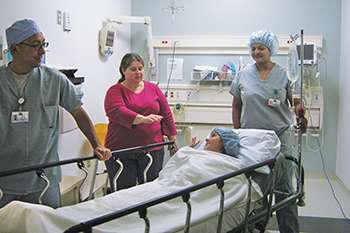What to Know About Anesthesia

The Pediatric Perioperative Surgical Home (PPSH) is a team of experts that works to keep your child safe, comfortable and free from pain during and after your child’s surgery or procedure.
Our team includes expert anesthesiologists and nurse anesthetists, who have undergone advanced training in pediatric anesthesia. Together, they form an integral part of your child’s surgical team and will work with you to develop the right anesthesia plan for your child.
Types of Anesthesia
Your child’s physician anesthesiologist will determine the safest and most effective type of anesthesia based on the type of surgery, your child’s age and your child's medical condition. He or she will discuss the risks of anesthesia with you. We encourage you to ask any questions.
Before we give anesthesia, we may give your child a sedative to make him/her feel calm and relaxed. This happens before we move your child into the operating room (OR). Once in the OR, the different types of anesthesia we may use include:
- Local anesthesia: We use local anesthesia to numb a small area so that your child does not feel pain there. With local anesthetic, the child remains conscious. Often, we combine a local anesthetic with other types of anesthesia for comprehensive pain management.
- Regional anesthesia: We use regional anesthesia to numb an entire area of the body so that your child does not feel pain anywhere in that area. An epidural is an example of regional anesthesia. If used alone, your child would remain conscious. However, most children receive general anesthesia in addition to regional, since typically it is very difficult for children to remain still for the entire length of the surgery or procedure.
- General anesthesia: With general anesthesia, your child remains asleep and pain-free for the whole surgery. Your child will inhale the anesthesia through a breathing mask. For older children, we may give it through an intravenous (IV) line that puts the medicine directly into the vein. Sometimes we place a breathing tube after your child is asleep to help your child breathe safely during surgery. When the surgery is over, anesthesia stops. As the medications wear off, your child will gradually wake up.
Waking From Anesthesia
Each child wakes up from anesthesia differently. Some become wide awake in the recovery room. Others may be groggy for hours. It may take children one to two hours to fully wake from anesthesia in the recovery room. We will contact you as soon as possible to reunite you with your child, either in the recovery room, known as the post-anesthesia care unit (PACU), or the intensive care unit (ICU), depending on the type of surgery.
About one-third of all children experience confusion or excitement, known as “emergence delirium,” as they wake from anesthesia. Emergence delirium is a common reaction that can happen to any child, especially those younger than 6 years old. It may cause children to cry inconsolably and sometimes even scream or thrash. This may be upsetting to parents who assume their child is in pain.
Important things to remember about emergence delirium:
- It does not mean your child is in pain.
- It will go away on its own.
- Your child will not remember it.
Members of the surgical team will be there in the PACU or ICU with you and can talk you through it. The best role for you as a parent or guardian is to try to stay calm and comfort your child during the excited states.
How Illness Can Affect Anesthesia
Sometimes even minor illness, such as a cough, runny nose or fever, can cause problems during surgery and anesthesia. If this is the case, your anesthesiologist may decide to postpone surgery. Before surgery, let your surgeon’s office know immediately if your child:
- Has been exposed to infectious diseases such as measles, mumps or chicken pox
- Had a fever, cough, runny nose, sore throat, nausea or diarrhea in the two weeks before surgery
- Seems “off” in another way, such as lack of energy and playfulness or sleeping more than usual
- Has taken any aspirin or ibuprofen in the three days before surgery
What to Read Next
Read about what to expect after your child’s surgery.